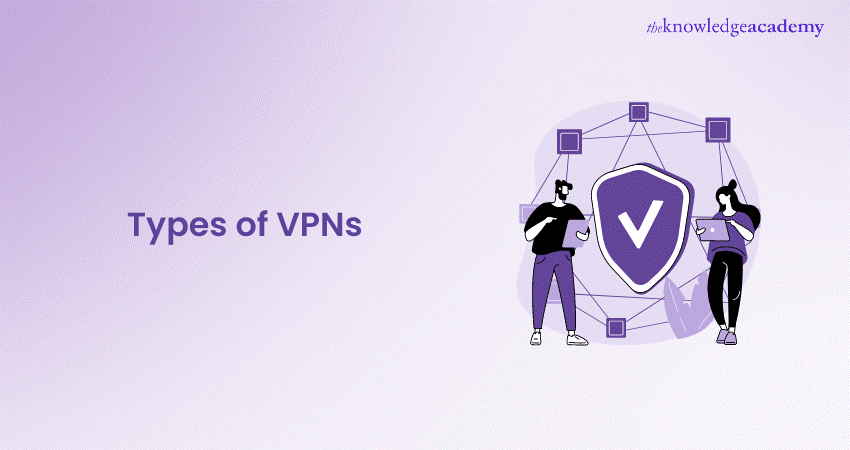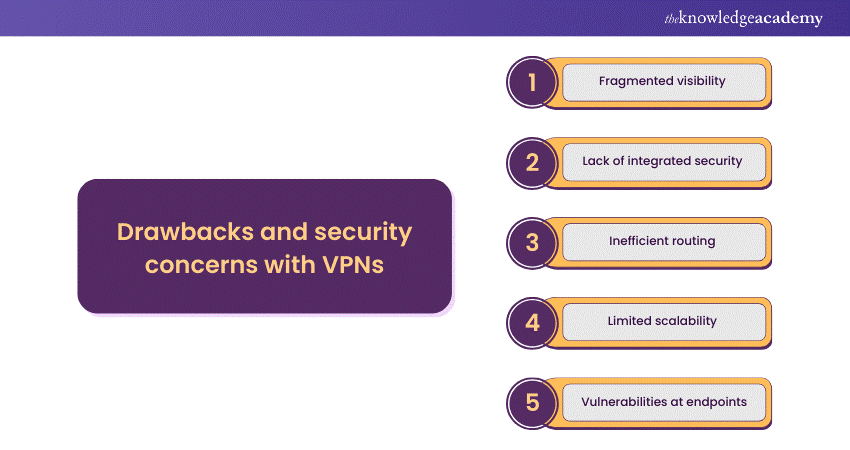We may not have the course you’re looking for. If you enquire or give us a call on 01344203999 and speak to our training experts, we may still be able to help with your training requirements.
We ensure quality, budget-alignment, and timely delivery by our expert instructors.

A Virtual Private Network (VPN) enables users to securely and privately connect to a private network over the Internet. It establishes an encrypted connection, known as a VPN tunnel, through which all internet traffic and communication pass securely.
In this blog, you will learn about the Types of VPNs, their security risks, and their potential impact on corporate cybersecurity. Read ahead to learn more!
Table of Contents
1) Different Types of VPN
a) VPN for remote access
b) VPN for site-to-site connections
c) VPN in the cloud
d) VPN for mobile devices
e) SSL-based VPN
f) PPTP (Point-to-Point Tunnelling Protocol) for VPN
g) L2TP (Layer 2 Tunnelling Protocol) VPN
h) OpenVPN
2) Drawbacks and security concerns associated with VPNs
a) Fragmented visibility
b) Lack of integrated security
c) Inefficient routing
d) Limited scalability
e) Vulnerabilities at endpoints
3) Conclusion
Different Types of VPN
The following are the various Types of VPNs:

1) VPN for remote access
A remote access VPN enables users to connect to a private network and remotely access all its services and resources. The connection between the user and the private network occurs through the internet, ensuring a secure and confidential connection. Remote access VPN proves beneficial for both home users and business users.
In the case of a company employee working away from the office, the VPN allows them to connect to the company's private network and access files and resources remotely. Private or home users of VPN primarily utilise these services to circumvent regional restrictions on the Internet and access blocked websites. Users with an awareness of internet security can also leverage VPN services to enhance their online security and privacy.
2) VPN for site-to-site connections
A site-to-site VPN, also known as a router-to-router VPN, is commonly employed by large companies. Companies or organisations with branch offices in different locations use site-to-site VPNs to connect the network of one office location to another.
1) Intranet-based VPN: When several offices of the same company are connected using the site-to-site VPN type, it is referred to as an intranet-based VPN.
2) Extranet-based VPN: When companies use the site-to-site VPN type to connect to another company's office, it is termed an extranet-based VPN.
3) VPN in the cloud
A cloud VPN is a Virtual Private Network that securely connects users to a cloud-based infrastructure or service. It utilises the Internet as the primary transport medium to connect remote users to cloud-based resources. Cloud VPNs are typically provided as a service by cloud providers like Amazon Web Services (AWS) and Microsoft Azure. Cloudflare offers a range of VPN solutions, including their 1.1.1.1 WARP service, which provides fast, secure, and privacy-focused internet connectivity for individuals and businesses.
They employ the same encryption and security protocols as traditional VPNs, such as IPsec or SSL, to ensure the secure transmission of data over the VPN. Organisations often use Cloud VPNs to securely connect their on-premises resources to cloud-based resources, such as cloud-based storage or Software-as-a-Service (SaaS) applications.
Discover the fundamentals of networking with our Introduction to Networking Training – Sign up today!
4) VPN for mobile devices
Mobile VPN is a Virtual Private Network that enables mobile users to securely connect to a private network, typically through a cellular network. It establishes a secure and encrypted connection between the mobile device and the VPN server, safeguarding the transmitted data. Mobile VPNs can be utilised to access corporate resources, such as email or internal websites, while the user is away from the office.
They can also securely connect to public Wi-Fi networks, protecting users' personal information from interception. Mobile VPNs are available as standalone apps or can be integrated into Mobile Device Management (MDM) solutions, commonly used by organisations to secure their mobile workforce.
5) SSL-based VPN
SSL VPN (Secure Sockets Layer Virtual Private Network) employs the SSL protocol to secure the connection between the user and the VPN server. It allows remote users to access a private network securely by establishing an encrypted tunnel between the user’s device and the VPN server.
SSL VPNs are typically accessed through a web browser rather than a standalone client, making them easier to use and deploy as they don’t require additional software installation on the user’s device. They can access internal resources like email, file servers, or databases. SSL VPNs are considered more secure than traditional IPsec VPNs as they use the same encryption protocols as HTTPS, the secure version of HTTP for online transactions.
6) PPTP (Point-to-Point Tunnelling Protocol) for VPN
PPTP (Point-to-Point Tunnelling Protocol) is a type of VPN that employs a simple and fast method for implementing VPNs. It establishes a secure connection between two computers by encapsulating their data packets. PPTP is relatively easy to set up and doesn’t require any additional software installation on the client’s device.
It can access internal resources like email, file servers, or databases. Although PPTP is one of the oldest VPN protocols and is supported on a wide range of operating systems, it is considered less secure than other VPN protocols like L2TP or OpenVPN, as it uses a weaker encryption algorithm and has been known to have security vulnerabilities.
Establish a strong IT foundation with our IT Fundamentals Training – Sign up now!
7) L2TP (Layer 2 Tunnelling Protocol) VPN
L2TP (Layer 2 Tunnelling Protocol) is a VPN that establishes a secure connection by encapsulating data packets sent between two computers. L2TP is an extension of PPTP; it adds more security to the VPN connection by combining PPTP and L2F (Layer 2 Forwarding Protocol) and uses a more robust encryption algorithm than PPTP.
L2TP is relatively easy to set up and doesn’t require additional software installation on the client’s device. It can access internal resources like email, file servers, or databases. While supported on a wide range of operating systems, L2TP is considered less secure than other VPN protocols, such as OpenVPN, as it still has some vulnerabilities that can be exploited.
8) OpenVPN
OpenVPN is an open-source software application that uses SSL and is highly configurable and secure. Encapsulating the data packets establishes a secure and encrypted connection between two computers. OpenVPN can access internal resources like email, file servers, or databases. Supported on various operating systems and devices, it can be easily configured to work with multiple network configurations and security settings. OpenVPN is one of the most secure VPN protocols, which uses industry-standard SSL/TLS encryption protocols and offers advanced features such as two-factor authentication and a kill switch.
Drawbacks and security concerns associated with VPNs
The following are the drawbacks and security concerns associated with VPNs:

1) Fragmented visibility
Fragmented visibility is a significant drawback associated with VPNs. This refers to the challenge of obtaining a comprehensive view of network traffic and user activities due to the encrypted nature of VPN connections. Monitoring and managing network performance becomes more complex, potentially leading to difficulties in identifying and mitigating issues.
2) Lack of integrated security
A notable concern with VPNs is the need for integrated security features. While VPNs provide encryption for data in transit, they may not include robust security measures beyond that. This absence of comprehensive security features can leave networks vulnerable to advanced threats and attacks, requiring additional layers of protection to ensure overall system security.
3) Inefficient routing
VPN connections can sometimes need more efficient routing, leading to suboptimal performance. This can result in slower data transfer rates and increased latency, especially when dealing with large volumes of data. Inefficient routing may impact the user experience and overall network efficiency, making it essential to optimise routing configurations for improved performance.
4) Limited scalability
Scalability issues are another drawback associated with VPNs. As network demands increase, traditional VPN solutions may need help to scale effectively to accommodate growing user numbers and data traffic. This limitation can hinder organisations' ability to expand their networks seamlessly, necessitating careful planning and potential infrastructure upgrades.
5) Vulnerabilities at endpoints
Endpoints, such as individual devices connecting to the VPN, can pose security risks. Malicious actors may exploit vulnerabilities at these endpoints to gain unauthorised access to the network. Security protocols and updates on user devices become critical, and the failure to address vulnerabilities at endpoints can compromise the overall security of the VPN infrastructure.
Learn about security-based and layer-based VPN architectures with our VPN Training today!
Conclusion
In summary, a VPN establishes a secure, encrypted connection between two endpoints. Essentially, the client machine encrypts data for transmission, the VPN endpoint decrypts it, and the process reverses when the destination server responds. This cyclical encryption ensures the confidentiality and security of data throughout the VPN connection. However, it's important to be aware of the disadvantages of VPN as well. We hope you have understood various types of VPNs through this blog!
Stay ahead in the digital world with our Cloudflare Training – Sign up now!
Frequently Asked Questions
What are the four main Types of VPN?

The four primary types of VPN encompass Mobile VPN, designed for secure mobile connections; SSL VPN, offering remote access through web browsers; PPTP VPN, known for its simplicity and speed; and L2TP VPN, which enhances security by combining protocols.
Which Type of VPN is best?

The optimal VPN type varies based on specific needs. SSL VPNs are user-friendly and accessible via web browsers, while OpenVPN is celebrated for its robust security features, making it a preferred choice for those prioritising data protection.
What are the different types of VPN services?

Diverse VPN services include remote access VPNs for individual connections, site-to-site VPNs linking networks, and Extranet VPNs facilitating secure communication between organisations. Each service caters to distinct connectivity requirements.
What are the other resources and offers provided by The Knowledge Academy?

The Knowledge Academy takes global learning to new heights, offering over 3,000 online courses across 490+ locations in 190+ countries. This expansive reach ensures accessibility and convenience for learners worldwide.
Alongside our diverse Online Course Catalogue, encompassing 19 major categories, we go the extra mile by providing a plethora of free educational Online Resources like News updates, Blogs, videos, webinars, and interview questions. Tailoring learning experiences further, professionals can maximise value with customisable Course Bundles of TKA.
What is the Knowledge Pass, and how does it work?

The Knowledge Academy’s Knowledge Pass, a prepaid voucher, adds another layer of flexibility, allowing course bookings over a 12-month period. Join us on a journey where education knows no bounds.
What are related IT Support and Solution Courses and blogs provided by The Knowledge Academy?

The Knowledge Academy offers various IT Support and Solution Courses, including Cloudflare Training, IT Fundamentals Training, and Introduction to Networking Training. These courses cater to different skill levels, providing comprehensive insights into IT Support and Solution methodologies.
Our IT Support and Solution blogs cover a range of topics related to PRINCE2, offering valuable resources, best practices, and industry insights. Whether you are a beginner or looking to advance your IT Support and Solution skills, The Knowledge Academy's diverse courses and informative blogs have you covered.
Upcoming IT Infrastructure & Networking Resources Batches & Dates
Date
 CloudFlare Training
CloudFlare Training
Fri 23rd May 2025
Fri 25th Jul 2025
Fri 26th Sep 2025
Fri 28th Nov 2025






 Top Rated Course
Top Rated Course



 If you wish to make any changes to your course, please
If you wish to make any changes to your course, please


